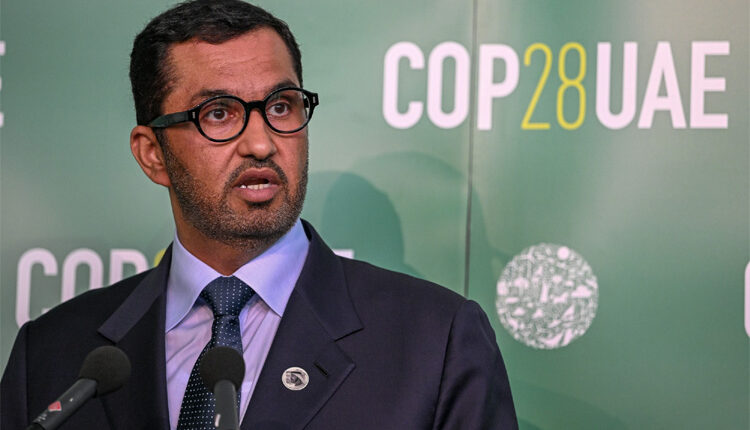COP28: Doubling energy efficiency, raising hydrogen production top agenda
Trebling renewable energy capacity, doubling energy efficiency, and raising hydrogen production to 180 million tonnes (Mt) per year by 2030 are the highlights of COP28 president-designate Sultan Al Jaber’s plan for the UN Climate Conference (COP28) scheduled to be held in Dubai in November, he said on Thursday, adding that these goals will be critical in keeping global warming under 1.5°C over pre-industrial levels.
Al Jaber, who is the UAE’s industry and advanced technology minister, is also CEO of State oil giant Abu Dhabi National Oil Corporation (ADNOC) and the founding CEO of Masdar, a government-owned renewable energy company. Being the first serving oil firm CEO to take the post of COP28 president, and with his country heavily dependent on petroleum and natural gas, experts and activists had raised concerns about potential conflicts of interest since his nomination in January.
On Thursday, Al Jaber said the phasing down of fossil fuels is inevitable, while addressing a ministerial meeting on climate action with the environment ministers of the EU, Canada, and China in Brussels. He also called for a comprehensive transformation of climate finance instead of piecemeal reforms, with a special focus on supporting “climate-positive development” across the Global South.
“Today, I’d like to walk you through our plan of action. This plan is guided by a single north star. And that is keeping 1.5 [°C] within reach. To do this, we aim to match the highest ambition for the negotiated outcomes with an equally strong and robust action agenda that can implement those outcomes in the real world,” he said.
The main challenge facing COP28 is a deep trust deficit among developed and developing countries. At the Bonn climate talks in June, a formal agenda could not be adopted until a day before the meeting was to officially close. This was mainly because in line with the Paris Agreement’s principles of equity and common but differentiated responsibilities, developing countries sought an agenda on finance for scaling up mitigation action. But developed countries led by the US and the EU opposed the agenda stating that existing mechanisms address the issue of finance.
There was a sense of disappointment because there was little progress on action and an erosion of trust among rich and developing countries at the critical Bonn conference. Developed countries want mitigation burden to be shared equally by all countries to meet the 1.5°C goal. Developing countries want the burden of climate mitigation be shared based on historical responsibility. They also expect scaled up finance for energy transition. Island nations demand that the 1.5°C goal is not breached because it is a question of survival for most of them.
Al Jaber called for collective ownership of the global stocktake. “We must be brutally honest about the gaps that need to be filled, the root causes and how we got here. Then we must apply a far-reaching, forward-looking, action-oriented and comprehensive response to address these gaps,” he added. Global stocktake is the process for reviewing the implementation of the Paris Agreement and its goal of keeping global warming to well below 2°C and pursuing efforts to keep it under 1.5°C above pre-industrial levels. It is scheduled to be held at COP28 in Dubai this November.
“On fast-tracking the transition, we must be laser focused on building the energy system of the future, a system free of unabated fossil fuels, including coal, using all available technologies, while we rapidly decarbonise the system of today. As I’ve said many times, the phase down of fossil fuels is inevitable. It is in fact essential. And it must also be responsible…We will co-create a practical action plan, based on the science, around pathways consistent with keeping 1.5°C within reach. On the supply side, we are partnering with governments in the north and south to double energy efficiency, triple renewable energy capacity to 11,000 GW, and double hydrogen production to 180 million tonnes per year by 2030,” Al Jaber added.
He urged all parties to update their nationally determined contributions (NDCs) under the Paris Agreement to keep the 1.5°C goal of Paris Agreement within reach.
“Strong demand signals must come from the top through NDCs. The UAE just submitted a third update to its second NDC that pushes emission reductions to 40%, compared to business as usual, with clearly defined targets for all domestic sectors. That’s an almost 10% improvement on the previous disclosure. This aligns with our 2050 net zero initiative and our ambition to keep 1.5°C within reach. At the same time, we will invest $54 billion to triple clean energy capacity by 2030, massively scale up hydrogen while maintaining zero coal in our energy mix. And I call on all governments to update their NDCs by September of this year, ensuring alignment with the Paris Agreement,” he said.
“COP28 President Al Jaber outlined the plan today, emphasising efforts to keep warming below 1.5°C as the central focus of the climate summit. We are already experiencing the hottest days in over 125,000 years. We are witnessing record-shattering heatwaves, floods, and wildfires at 1.2°C warming. It is clear that the time has come to end the era of fossil fuels. COP28 must initiate a roadmap for a just and equitable transition that benefits workers and communities and supports the countries least responsible for the climate crisis,” said Harjeet Singh, head of global political strategy for Climate Action Network International.
“This needs to occur alongside establishing ambitious targets for renewable energy and the scaling up of finance to implement climate action and support those suffering from climate-induced loss and damage,” he added.


Comments are closed.